NHL-bound Devon Levi explores the space between his two goals: computer science and hockey
Author: Milton Posner
Date: 01.30.23
It’s not that Devon Levi doesn’t understand what a “normal” college hockey player is supposed to do. He understands just fine; he just doesn’t care.
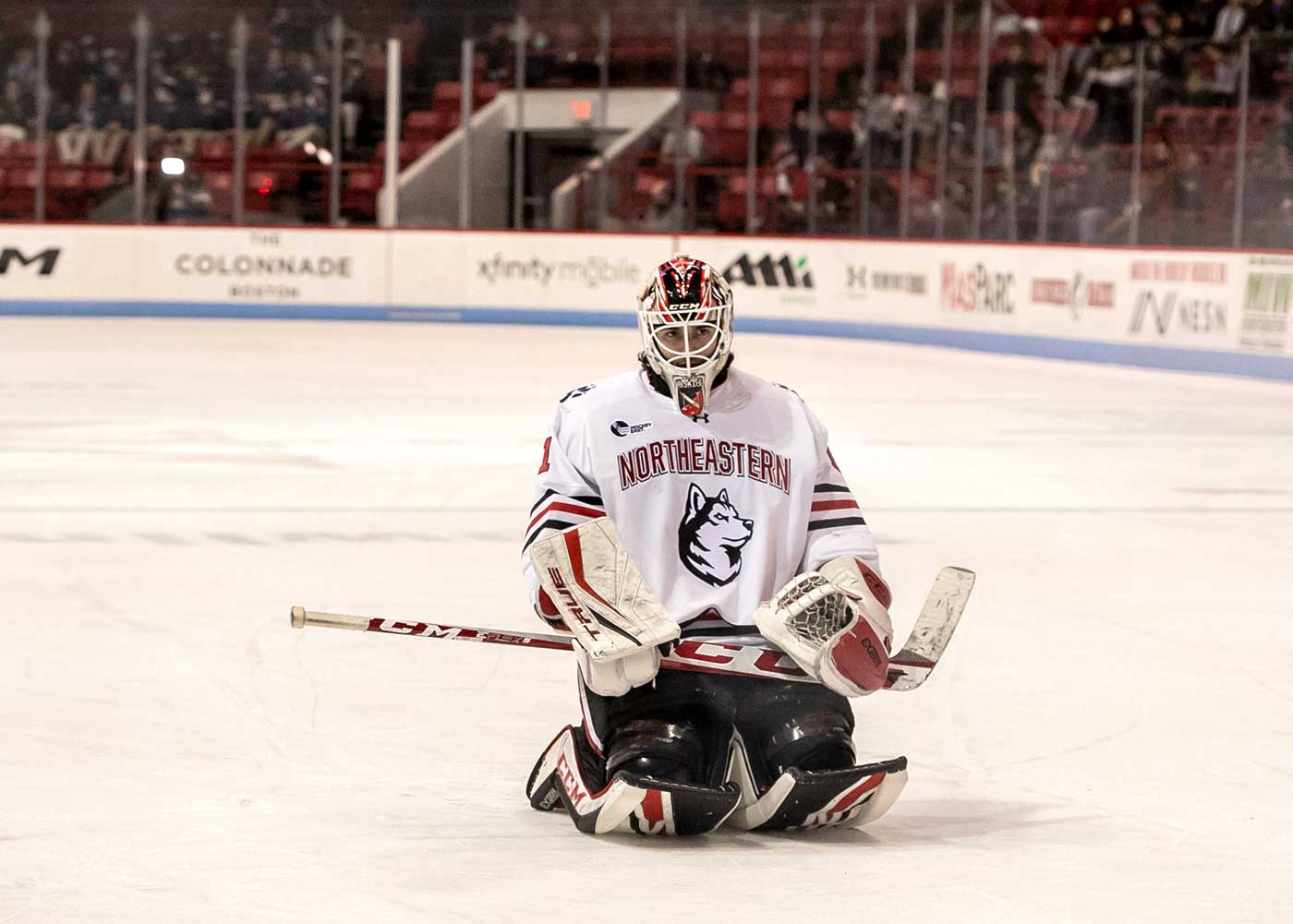 Photos by Sarah Olender.
Photos by Sarah Olender.
During TV timeouts, as his teammates huddle and strategize, Levi drops to his knees and meditates on the ice à la Qui Gon Jinn in The Phantom Menace. After posting one of the best goaltending seasons college hockey had ever seen, the Buffalo Sabres prospect opted against turning pro, choosing instead to remain in college and develop on his own timeline.
And at Northeastern, Levi’s initial coach, Jim Madigan, was the first to see just how unusual he was.
“He asked me, ‘What are you planning on majoring in?’ I said, ‘Computer science’ and he just said ‘What?’” Levi recalls with a wide smile. “He said, ‘I don’t think any Northeastern hockey player has ever taken computer science before,’ and I said, ‘Oh, alright. I guess I’ll take on the challenge and be the first.’”
Madigan had coached Northeastern men’s hockey for nearly a decade at that point, and had guided the 90-year-old program to its greatest sustained success. He had seen a lot, but he had never seen this. Amid a sea of skaters who typically pursue general studies, business, or communications, here was Levi — unbothered by the weight of expectations and eager to forge his own academic path. While he eventually added business to his now-combined major, he kept computer science, which makes his workload tough to balance even by elite student-athlete standards.
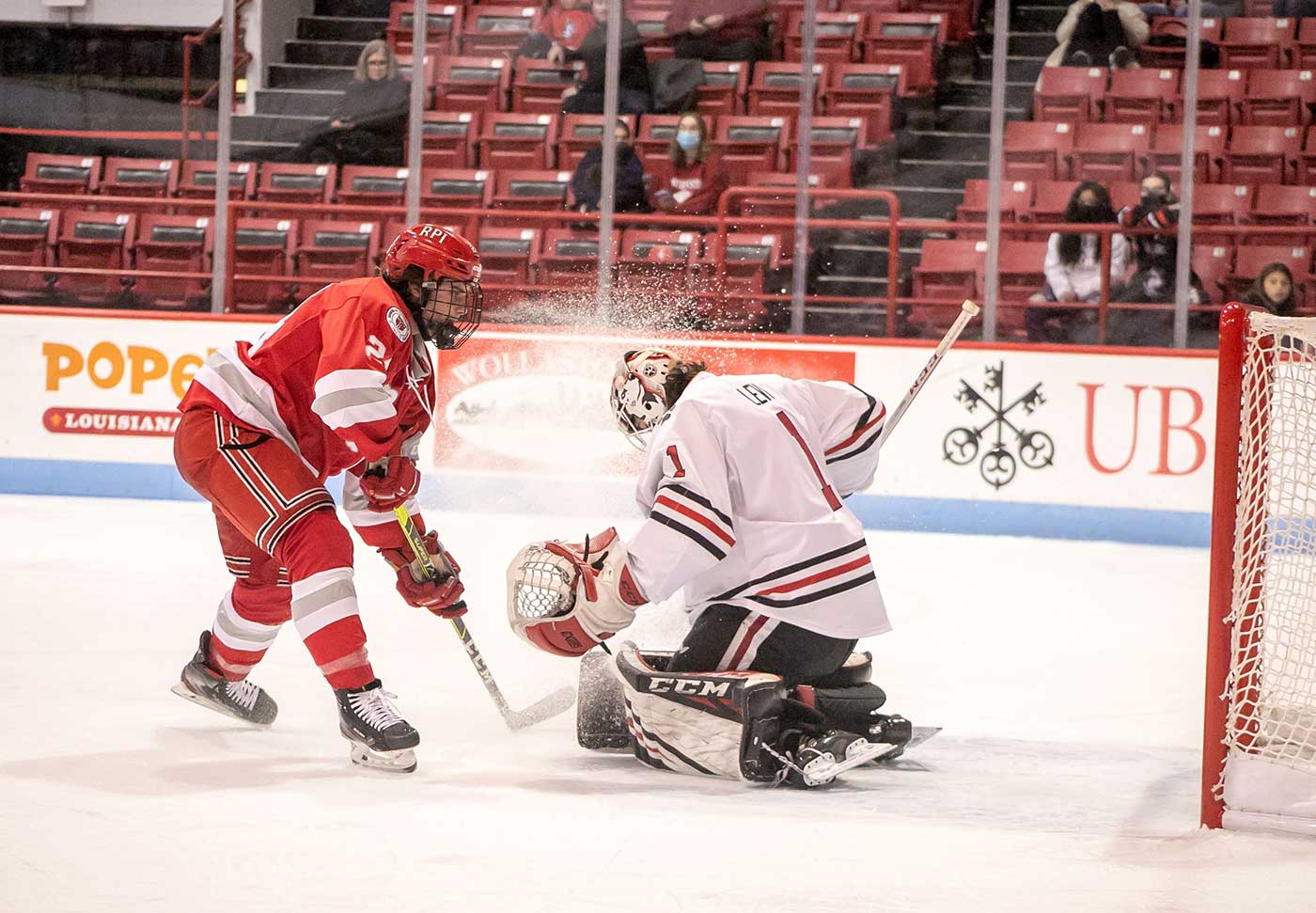
Levi’s computing drive began just as his passion for hockey did: with his father. Laurent Levi is a process automation engineer, a managing partner of the Montreal-based Higrowth Engineering Group, and a believer in AI’s potential to spare humans from tedious work. As the manager of SHAIN, the company’s intellectual automation division, Laurent spearheaded an AI platform that converts recorded conversations into structured reports to provide managers with enhanced R&D intelligence.
“He showed me the business and explained that this part of school is part of the future, and that there’s so much opportunity in the field after you graduate,” Levi says. “He convinced me to try it out, but I knew it wasn’t going to be easy.”
Levi was correct. His freshman year at Khoury College found him rebounding between the rink and his dorm room, working to balance hockey with Fundamentals of Computer Science 1 (“Fundies”) — two things legendary across the Boston campus for their difficulty.
“It was nuts,” he says. “But I’ve figured out how to manage that a bit better now that I’m a third year. I can have fun with my teammates, get my studying done, and play hockey.”
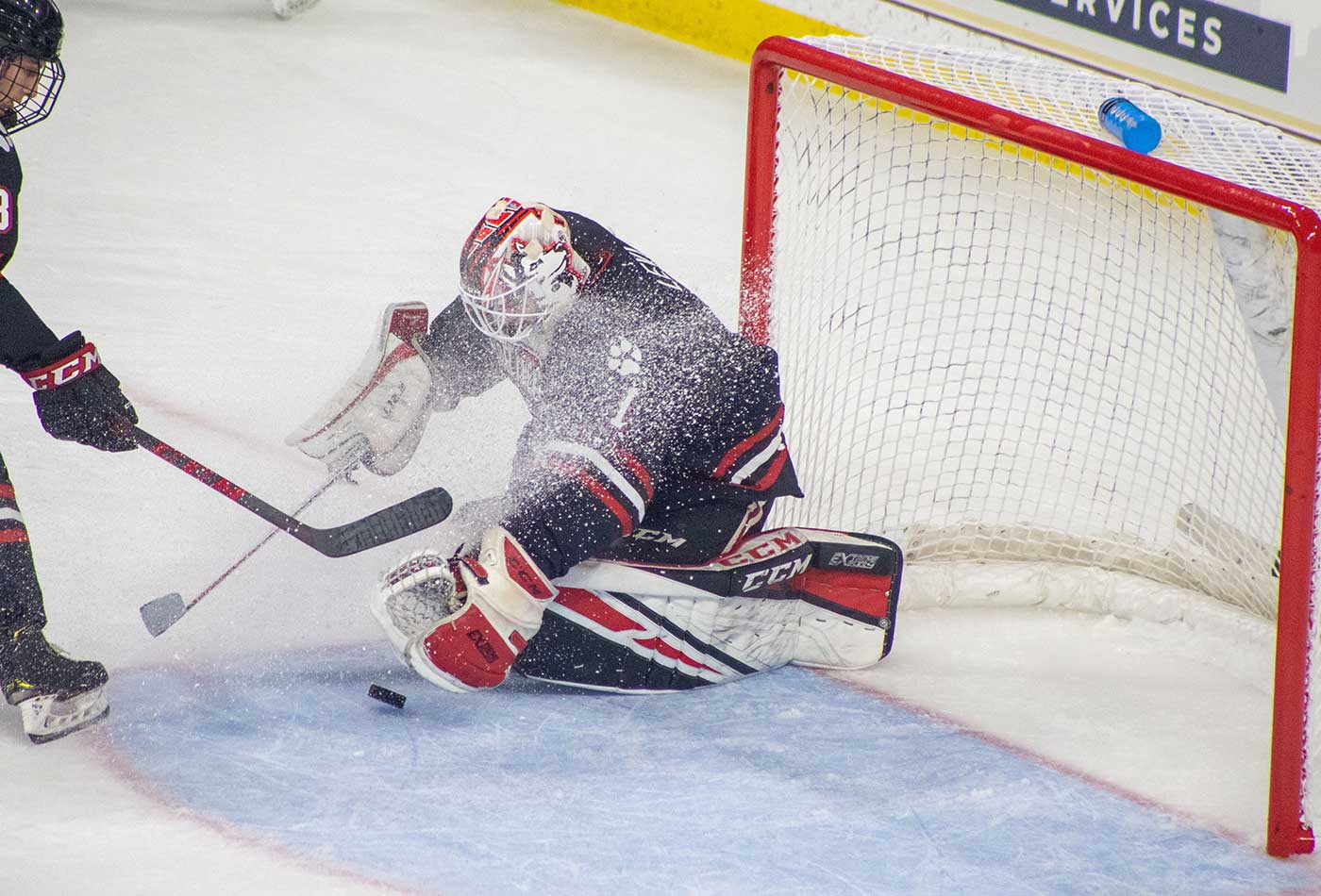
That balance is hard-earned. During the season, Levi typically wraps up his classes around 1:30 p.m. and heads straight to Matthews Arena for a four-hour practice. Monday, Tuesday, and Wednesday nights are crucial; if Levi can square away his coursework in time, he’s free to focus on his Thursday game prep and his Friday and Saturday games, at least one of which typically demands travel. Sunday, the team’s NCAA-mandated off day, is another homework day, lest Levi fall behind before the start of the next week.
“I don’t have the luxury of studying as long as other students do, so I’ve got to pay attention and try to get the material down in class. That way, I can maximize my time outside the rink, rather than playing catch-up,” Levi says. Juggling midterms, finals, and his three weeks in Beijing with Team Canada during last year’s Winter Olympics, he added, makes the whole thing trickier. “When I’ve been away, my professors have extended deadlines and helped me get the work in. I can’t thank Khoury College and Northeastern enough for that; they’ve been super supportive.”
But Levi hasn’t just balanced computer science and hockey; he’s blended them. When he was sidelined with a fractured rib in 2021 and unable to step on the ice, he used VR platform Sense Arena to improve his puck tracking. He found the device so smooth and realistic that he still uses it for warm-ups, and says it has piqued his interest in pursuing similar hockey-and-computer-science projects down the road.
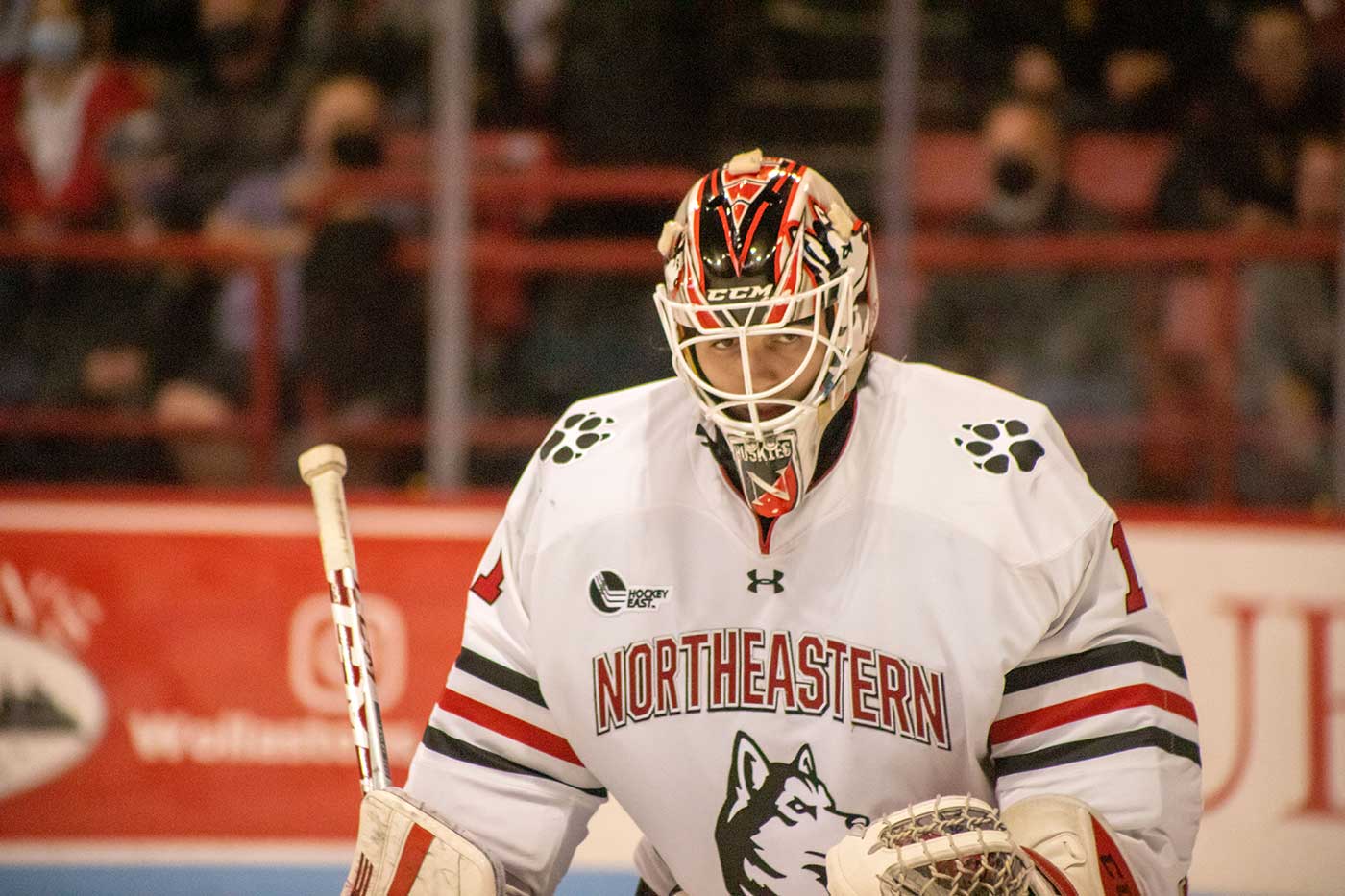
Levi has also found two pertinent overarching lessons at the nexus of these two passions. One comes courtesy of Marco Raimondo, Levi’s goalie coach from back home in Montreal, who compared hockey games to tests in class: the more you study during the week, the higher your confidence, and the better your performance.
“[Levi] has an engineer’s mind, where things add up to a final answer; that’s how I see him compute the game,” Raimondo told The Athletic in July. “He always does these little things that prove that he’s special. He’s that much different than everybody else.”
The other lesson is more on the nose.
“The way you learn to approach CS problems is applicable in life, and to my sport,” Levi explains. “There will always be problems when you’re playing — you’re getting scored on, something’s not going right — and it’s like there’s a bug in your code. You’ve got to find the mistake and fix it.”
The success of Levi’s lessons is inarguable. In the World Junior Championship with Team Canada, he stonewalled top international talent with a record .964 save percentage. Last season, he won the Richter Award as college hockey’s best goalie, posting outlandish numbers and launching the Huskies to their first-ever Hockey East regular-season title. This season, he broke the team’s career shutout record, accomplishing in 41 games what former record holder Chris Rawlings couldn’t do in 123.
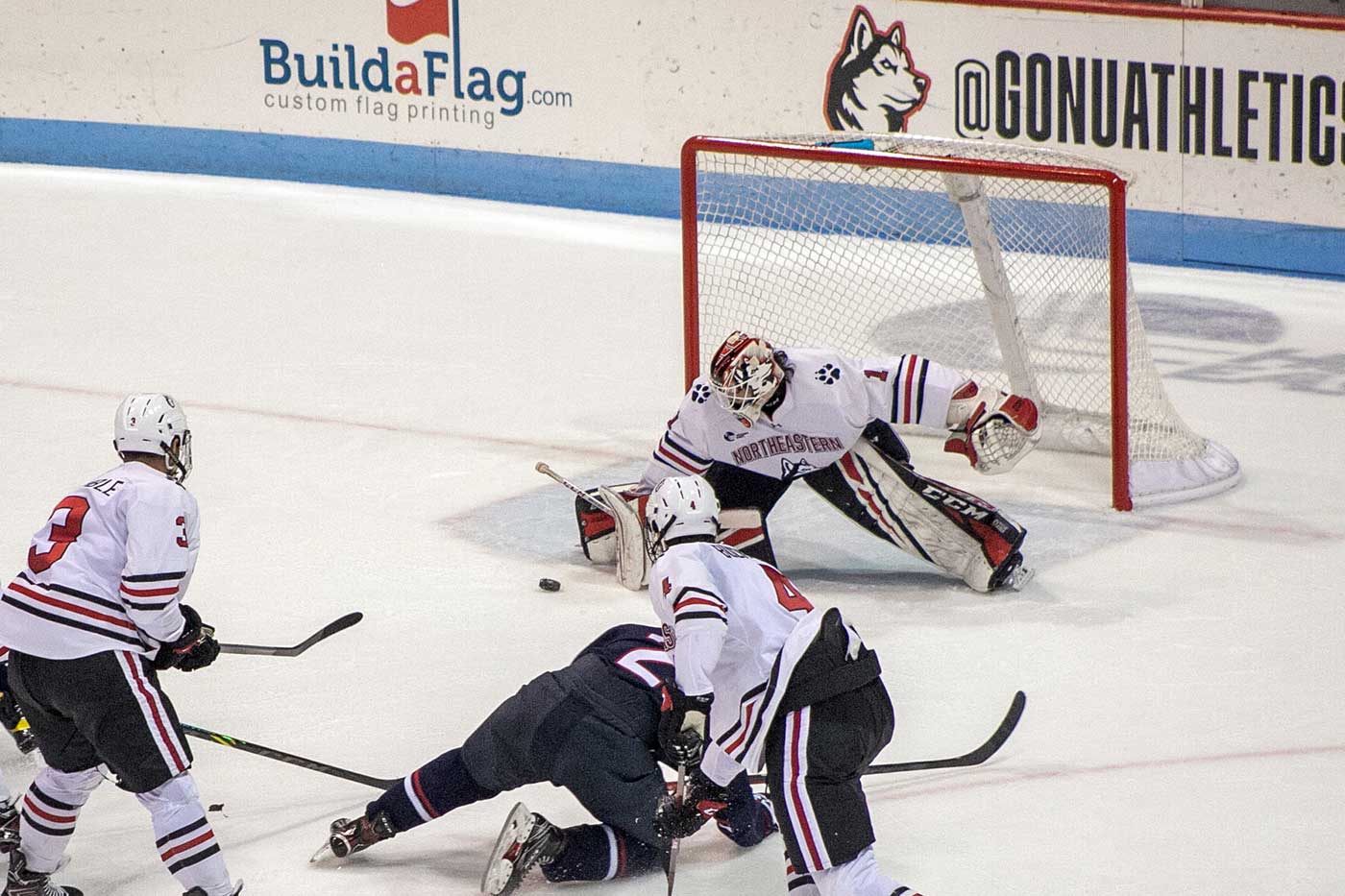
His stock didn’t start sky-high by NHL standards; at six feet even, Levi is at least two inches shorter than most elite goaltenders, which helps to explain why he stayed on the 2020 draft board until the Florida Panthers selected him sixth to last. After the Panthers traded his rights to the Sabres, Levi exhibited the same forge-his-own-road approach he’s always shown, content to marinate and develop at the college level. He hasn’t decided when he’ll go pro; he’s enjoying his time in college, and the Sabres haven’t rushed him, confident in his growth strategy. After all, he’s made unexpected, atypical decisions about when to jump levels before, and — powered by stellar athleticism and clever positioning in net — exceeded all expectations.
But as he prepares for his first Beanpot and looks forward to a career in the NHL, Levi doesn’t expect to turn his back on computer science. He intends to continue pursuing his degree even if he goes pro at the end of this year, his third at Northeastern.
“Jim Madigan’s been awesome about providing players the opportunity to do online school and extend classes for as long as they need to get their degrees,” Levi said of the coach who recruited him, now Northeastern’s athletic director.
And after years of his father impressing on him the importance of blending business savvy with coding know-how, Levi is excited to explore the “whole world of things” he can do with a computer science and business degree.
“You can’t play hockey your whole life. It comes to an end by age 40, and I can’t see myself sitting around doing nothing when I’m 40,” Levi says. “I’m trying to get my degree, but it’s also about doing something with it later in life. I know I’ll look back and be happy that I put in the work and grinded for a few years. For the rest of my life, I’ll have the opportunity to do what I want to do.”
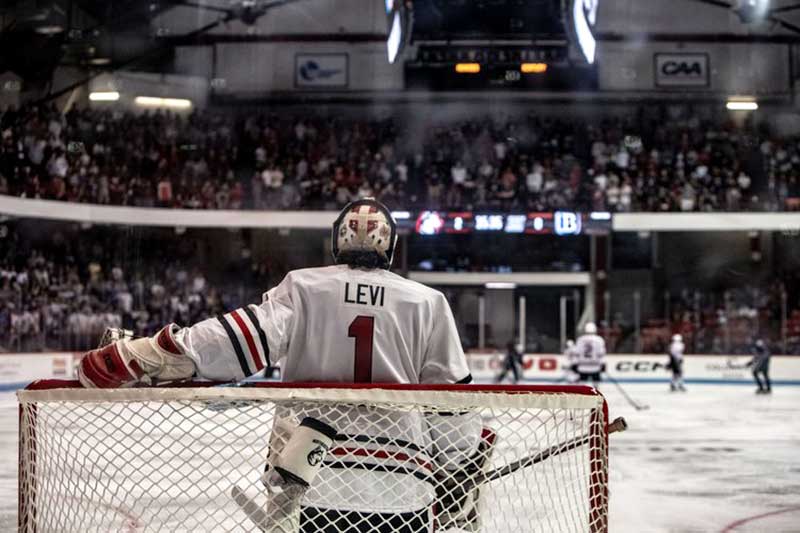
Subscribe to Khoury News
The Khoury Network: Be in the know
Subscribe now to our monthly newsletter for the latest stories and achievements of our students and faculty